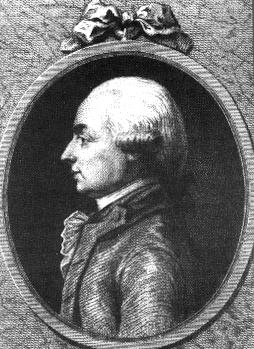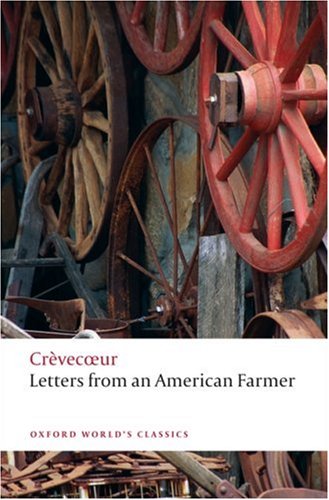Background
Michel Guillaume Jean de Crèvecoeur was born in Caen, France, on December 31, 1735. (Later he would sign his first book J. Hector St. John. )



(Written by an emigrant French aristocrat turned farmer, t...)
Written by an emigrant French aristocrat turned farmer, the Letters from an American Farmer (1782) posed the famous question: "What, then, is the American, this new man?", as a new nation took shape before the eyes of the world. Addressing some of American literature's most pressing concerns and identity issues, these Letters celebrate personal determination, freedom from institutional oppression, and the largeness and fertility of the land. They also address darker and more symbolic elements, particularly slavery. This book is the only critical edition available of what is seen by many as the first-ever work of American literature. About the Series: For over 100 years Oxford World's Classics has made available the broadest spectrum of literature from around the globe. Each affordable volume reflects Oxford's commitment to scholarship, providing the most accurate text plus a wealth of other valuable features, including expert introductions by leading authorities, voluminous notes to clarify the text, up-to-date bibliographies for further study, and much more.
http://www.amazon.com/gp/product/0199554749/?tag=2022091-20
Michel Guillaume Jean de Crèvecoeur was born in Caen, France, on December 31, 1735. (Later he would sign his first book J. Hector St. John. )
After a Jesuit education and a visit in England, where he learned English, he served as a map maker with Louis Montcalm's army in Canada from about 1755 to 1759. He left the army but stayed in the New World.
In the New World after a good deal of traveling, working as a surveyor, and note-taking, he became a farmer, first in Ulster County, then in Orange County, N. Y.
For a time his life was idyllic, but the American Revolution interrupted it. Unwilling to commit himself to either side at the time, he tried to visit France, which led to his imprisonment by the British for 3 months. Finally, in 1780 he returned to his old home in France via Dublin and London. While in London he arranged for publication of his most famous work, Letters from an American Farmer (1782). The book provides a comprehensive picture of American life, from Nantucket to Charleston: manners, customs, education, plant and animal life. Crèvecoeur posed as a provincial who sought to answer typical European questions about America. The most memorable portion is Letter Three, "What is an American?" The book made Crèvecoeur famous. It was published in Philadelphia, as well as in Ireland, Holland, and Germany. He prepared a second edition, in French, much enlarged and more literary: Letters d'un cultivateur américain (1784). The original English versions of some of these letters were not published until 1925 (Sketches of Eighteenth Century America). He developed packet-boat service between France and New York. In time ill health largely incapacitated Crèvecoeur. In June 1785 he returned to France, seeking to improve commercial relations between France and America. He prepared a three-volume version of the French Lettres, published in 1789, the year of his return to America and to his position as consul. Under the pen name of Agricola, his letters on potato culture, sheep feeding, sunflower oil, and other topics were published in various American journals. In 1790 Crèvecoeur left America for the last time.
For a while he lived quietly in his father's home in Normandy, for his health was poor and the French Revolution was in progress. He kept in touch with America through a son farming in New Jersey, and he wrote his longest work. It appeared in 1801 as Le Voyage dans la Haute Pennsylvania et dans l'état de New-York (available in English as Eighteenth-Century Travels in Pennsylvania and New York, 1961). It has never been as popular as the Letters, Crèvecoeur spent 3 of his last years in Munich, where his son-in-law was minister plenipotentiary. He died in France in 1813.
(Written by an emigrant French aristocrat turned farmer, t...)
Crèvecoeur, for all his love of liberty, opposed the Revolution.
Quotations:
"Men are like plants; the goodness and flavor of the fruit proceeds from the peculiar soil and exposition in which they grow. We are nothing but what we derive from the air we breathe, the climate we inhabit, the government we obey, the system of religion we profess, and the nature of our employment. "
"What, then, is this new man, the American? They are a mixture of English, Scotch, Irish, French, Dutch, Germans, and Swedes. From this promiscuous breed, that race, now called Americans, have arisen. "
"He who governs himself according to what he calls his principles may be punished either by one party or the other for those very principles. He who proceeds without principle, as chance, timidity, or self-preservation directs, will not perhaps fare better; but he will be less blamed. "
"Most elegantly finished in all parts, [the hummingbird] is a miniature work of our Great Parent, who seems to have formed it the smallest, and at the same time the most beautiful of the winged species. "
In 1783, returning to America as French consul to New York, Connecticut, and New Jersey, he found that his wife had died and two children were missing. He located the children in Boston, then established a home in New York City.
In 1769 Crèvecoeur married to Mehitable Tippet, by whom he had three children, the eldest being named America-Francés.
